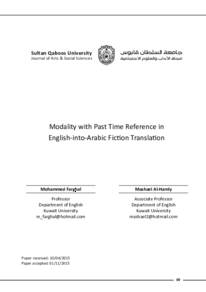Document
Modality with Past Time Reference in English-into-Arabic Fiction Translation.
Contributors
Al-Hamly, Mashael., Author
Publisher
جامعة السلطان قابوس. كلية الآداب والعلوم الاجتماعية
Gregorian
2016
Language
English
Subject
English abstract
Modality is a semantic medium that colors the way the language user views the world around him/ her in terms of certainty, necessity and obligation; hence, it places extra effort on the translator while attempting to capture modalistic shades of meaning. The task may become more challenging when the translator is dealing with a language pair where modality is grammar-oriented in one member (English, for example) and lexis-oriented in the other (Arabic, for example). The present paper aims to investigate the rendering of speaker participation in the speech event as embodied in modality when translating English fiction into Arabic. In particular, it will examine the corpus of two sets of data involving past modality (modal + have + past participle) extracted from two English novels which will be compared with their counterparts in the Arabic translations. Four main issues will be discussed. The first is to see whether the distinction between epistemic and deontic modality is maintained in translation. The second is to check whether the translators are sensitive to the import of modality in discourse as manifested in the speaker's attitudes toward what is happening. The third is to check whether English modalized propositions are sometimes erroneously rendered into modality-free Arabic propositions. Last, the study discusses the Arabic modality markers employed to capture past modality. Both a quantitative account (focusing on form and function) and a qualitative analysis (focusing on adequacy of translation procedures) are furnished.
Member of
ISSN
2312-1270
Resource URL
Citation
Farghal, M., & Al-Hamly, M. (2016). Modality with Past Time Reference in English-into-Arabic Fiction Translation. Journal of the College of Arts and Social Sciences, 7 (2), 69-81.
Arabic abstract
يعدّ التصويغ وسيلة دلالية يلقي المتحدًث من خلاله ظلالاً من المعنى تتعلق بموقفه تجاه درجة الظن والضرورة والوجوب. من هنا، فهو يشكًل عبئاً إضافياً على المترجم أثناء محاولته لنقل تلك الظلال. ويمكن لمهمة المترجم أن تصبح أكثر تحدياً إذا كان يتعامل مع لغتين تختلفان في أسلوب التصويغ، حيث تعتمد اللغة الإنجليزية التصويغ النحوي في معظم الأحيان، في حين تميل اللغة العربية نحو التصويغ المعجمي. وتسعي هذه الدراسة إلى تقصي قدرة مترجم الأدب الإنجليزي المتخيّل إلى العربية على الإحاطة بمشاركة المتحدث في الفعل اللغوي من خلال التصويغ. وتحديداً تقوم الدراسة بفحص مجموعتين من البيانات تتضمنان تصويغاً يدور حول الزمن الماضي تمّ استخراجهما من روايتين إنجليزيتين، ومن ثم تقارنهما بنظيرتيهما في الترجمتين العربيتين. وتطرح الدراسة أربع قضايا رئيسية. أولها التحقق فيما إذا المترجم واع بالتفريق بين التصويغ الظني والتصويغ الوجوبي. وثانيها تفحّص ما إذا كان المترجم قادراً على نقل الظلال الدلالية في كل منهما. وثالثها التحقق فيما إذا كان المترجم يميل نحو التخلص من هذه الظلال من خلال تحييدها. أما القضية الرابعة، فهي السعي إلى الوقوف على الأساليب النحوية والمعجمية التي توظفها العربية في نقل تلك الظلال. وللتحقيق هذه الأهداف، تقدم الدراسة عرضاً كمّياً وتحليلاً نوعيّاً لتلك البيانات.
Category
Journal articles

